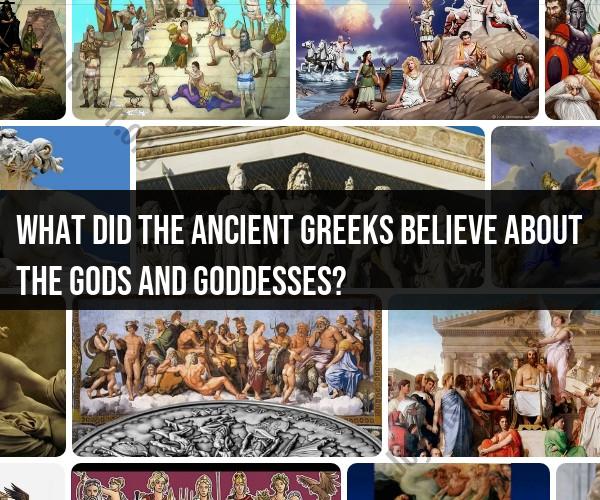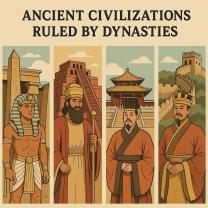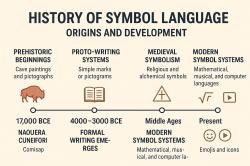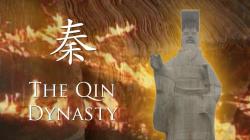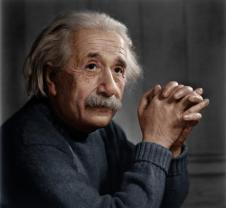What did the ancient Greeks believe about the gods and goddesses?
Ancient Greek beliefs about the gods and goddesses were a fundamental aspect of their culture and religion. The ancient Greeks had a complex and polytheistic belief system that included a pantheon of gods and goddesses, each with distinct characteristics, domains, and roles. Here are some key beliefs and aspects of ancient Greek religion regarding the gods and goddesses:
1. Polytheism: The Greeks believed in a multitude of gods and goddesses, each associated with various aspects of life, nature, and human existence. This polytheistic belief system allowed for the worship of different deities for different needs and occasions.
2. Anthropomorphism: The Greek gods and goddesses were often depicted as human-like figures with distinct personalities, emotions, and human traits. They were not seen as distant or abstract entities but as beings with human-like desires and characteristics.
3. The Olympian Gods: The most important and prominent gods and goddesses in Greek mythology were the Olympians. They resided on Mount Olympus and included deities like Zeus (king of the gods), Hera (queen of the gods), Athena (goddess of wisdom), Apollo (god of the sun and the arts), and many others.
4. Local Deities: In addition to the Olympians, the Greeks believed in numerous local and regional gods and goddesses. These deities often had specific associations with particular cities or regions.
5. Religious Rituals and Sacrifices: The ancient Greeks practiced various religious rituals and ceremonies to honor and appease the gods. These included sacrifices of animals, libations (offering of liquids, often wine), and prayers offered in temples and sanctuaries.
6. Myths and Legends: Greek mythology is rich with stories and legends about the gods and goddesses. These myths explained the origins of the world, the natural world, and the human condition. Myths often portrayed the gods' interactions with one another and with humans.
7. Oracle Consultation: The Greeks believed that certain individuals, such as the Oracle of Delphi, could communicate with the gods and provide divine guidance and prophecies. People sought oracles for advice on various matters.
8. Divine Favor and Wrath: The Greeks believed that the gods could show favor or wrath towards humans. To gain their favor, people performed acts of piety, honored the gods through rituals, and sought their guidance and protection.
9. Immortality: The gods and goddesses were considered immortal and eternal beings. While they could exhibit human-like emotions and behaviors, they were not subject to aging or death.
10. Ethical and Moral Guidance: Greek mythology often contained stories that conveyed moral and ethical lessons. The gods were sometimes seen as examples of both virtuous and flawed behavior, which served as guidance for human conduct.
11. Temples and Sanctuaries: Temples and sanctuaries were built in honor of specific gods and goddesses, and these places served as centers for religious practices and offerings.
It's important to note that beliefs and practices related to the gods and goddesses could vary by region and over time in ancient Greece. Greek religion was a central aspect of daily life, influencing art, literature, politics, and social customs. It persisted for centuries until the rise of Christianity in the later Roman period.
Ancient Greek Beliefs in Gods and Goddesses: An Overview
The ancient Greeks believed in a pantheon of gods and goddesses who were responsible for all aspects of the natural world and human life. The Greeks believed that the gods were immortal and had the power to influence their lives, both for good and for ill.
The Pantheon of Greek Gods and Goddesses
The Greek pantheon of gods and goddesses is vast and complex, but some of the most prominent deities include:
- Zeus: King of the gods and god of the sky and thunder
- Hera: Queen of the gods and goddess of marriage and childbirth
- Poseidon: God of the sea, earthquakes, and horses
- Demeter: Goddess of agriculture and the harvest
- Athena: Goddess of wisdom, crafts, and war
- Apollo: God of the sun, music, poetry, and healing
- Artemis: Goddess of the hunt, the moon, and wild animals
- Ares: God of war and violence
- Aphrodite: Goddess of love, beauty, and pleasure
- Hephaestus: God of fire, metalworking, and crafts
- Hermes: God of messengers, travelers, and thieves
- Dionysus: God of wine, revelry, and fertility
The Roles and Attributes of Prominent Greek Deities
Each of the Greek gods and goddesses had their own unique roles and attributes. For example, Zeus was the king of the gods and the ruler of the universe. Hera was the queen of the gods and the protector of marriage and childbirth. Poseidon was the god of the sea and earthquakes. Demeter was the goddess of agriculture and the harvest. Athena was the goddess of wisdom and crafts. Apollo was the god of the sun, music, and poetry. Artemis was the goddess of the hunt, the moon, and wild animals. Ares was the god of war and violence. Aphrodite was the goddess of love, beauty, and pleasure. Hephaestus was the god of fire, metalworking, and crafts. Hermes was the god of messengers, travelers, and thieves. Dionysus was the god of wine, revelry, and fertility.
Religious Practices and Rituals in Ancient Greece
The ancient Greeks practiced a polytheistic religion, meaning that they believed in multiple gods and goddesses. The Greeks worshipped their gods and goddesses through a variety of religious practices and rituals, such as prayer, sacrifice, and festivals.
The Greeks also built temples and shrines to their gods and goddesses. These temples and shrines were places where the Greeks could go to pray, make sacrifices, and leave offerings for their gods and goddesses.
The Influence of Greek Mythology on Culture and Literature
Greek mythology has had a profound influence on culture and literature throughout history. The stories of the Greek gods and goddesses have been retold and reinterpreted by artists, writers, and filmmakers for centuries.
The influence of Greek mythology can be seen in many different genres of literature, including poetry, drama, and fiction. Some of the most famous works of literature that have been influenced by Greek mythology include the Odyssey and the Iliad by Homer, the tragedies of Sophocles, Euripides, and Aeschylus, and the comedies of Aristophanes.
Greek mythology has also had a significant impact on visual art and architecture. Many famous works of art and architecture depict the Greek gods and goddesses, such as the Parthenon in Athens and the sculptures of Phidias and Myron.
Greek mythology is a rich and complex tradition that has had a profound impact on culture and literature throughout history. The stories of the Greek gods and goddesses continue to fascinate and inspire people today.
